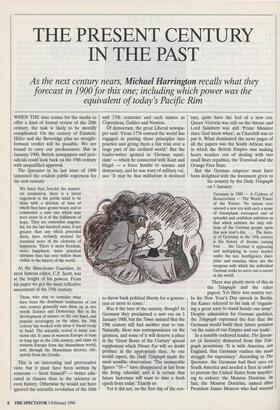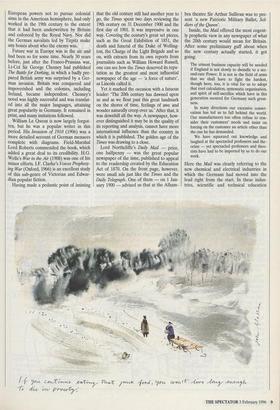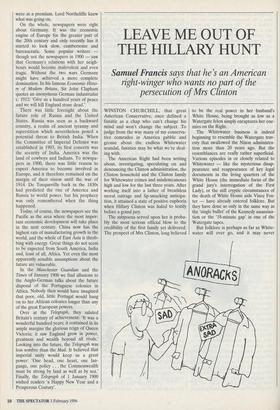THE PRESENT CENTURY IN THE PAST
As the next century nears, Michael Harrington recalls what they
forecast in 1900 for this one; including which power was the equivalent of today's Pacific Rim
WHEN THE time comes for the media to offer a kind of formal review of the 20th century, the task is likely to be morally complicated. On the century of Einstein, Hitler and the Beveridge plan no straight- forward verdict will be possible. We are bound to envy our predecessors. But in January 1900, British newspapers and peri- odicals could look back on the 19th century with unqualified approval.
The Spectator in its last issue of 1899 lamented the evident public eagerness for the new century:
We fancy that, besides the numeri- cal temptation, there is a latent eagerness in the public mind to be done with a division of time of which they have grown weary and to commence a new one which may have more in it of the fulfilment of hope. They are somewhat ungrate- ful; for the last hundred years, if not greater than any which preceded them, have certainly secured for mankind more of the elements of happiness. There is more freedom, more happiness, more practical altruism than has ever before been visible in the history of the world.
At the Manchester Guardian, its most famous editor, C.P. Scott, was at the height of his powers. From his paper we got the most reflective assessment of the 19th century:
Those who stay to consider what have been the dominant tendencies of our own century generally sum them up in two words: Science and Democracy. But in the development of science on the one hand, and popular sovereignty on the other, the 19th century has worked with ideas it found ready to hand. The scientific revival is many cen- turies old. It came in western Europe at least as long ago as the 13th century, and came to western Europe from the Musselman world, and, through the Musselman doctors, ulti- mately from the Greeks.
This is an interesting and provocative view, but it must have been written by someone — Scott himself? — better edu- cated in classics than in the sciences or even history. Otherwise he would not have ignored the scientific revolution of the 16th and 17th centuries and such names as Copernicus, Galileo and Newton.
Of democracy, the great Liberal newspa- per said: 'From 1776 onward the world has engaged in putting these principles into practice and giving them a fair trial over a large part of the civilised world.' But the leader-writer spotted in 'German mysti- cism' — which he connected with Kant and Hegel — a force hostile to science and democracy, and he was wary of military val- ues: 'It may be that militarism is destined to throw back political liberty for a genera- tion or more to come.'
Was it the turn of the century, though? In Germany they proclaimed a new era on 1 January 1900, but the Times insisted that the 19th century still had another year to run. Naturally, there was correspondence on the question, and some of it will deserve a place in the 'Great Bores of the Century' special supplement which Private Eye will no doubt produce at the appropriate time. As one would expect, the Daily Telegraph made the most sensible observation: 'The memorable figures "18—" have disappeared at last from the living calendar; and it is certain that future historians will want to date a fresh epoch from today.' Exactly so.
Yet it did not, on the first day of the cen- tury, quite have the feel of a new era. Queen Victoria was still on the throne and Lord Salisbury was still 'Prime Minister since God knew when', as Churchill was to put it. What dominated the news pages of all the papers was the South African war, in which the British Empire was making heavy weather out of dealing with two small Boer republics, the Transvaal and the Orange Free State.
But the German emperor must have been delighted with the treatment given to his country by the Daily Telegraph on 1 January:
Germany in 1900 — A Century of Resurrection — The World Power of the Future. No nation ever opened a new era with such a sense of triumphant retrospect and of splendid and confident ambition as that which animate the sixty mil- lions of the German people upon this new year's day. . . . The histo- ry of Germany in the 19th century is the history of dreams coming true . . . the German is appearing and multiplying in every market under the sun. Intelligence, disci- pline and stamina, these are the weapons with which the individual German seeks to carve out a career in the world.
There was plenty more of this in the Telegraph and the other papers. Yet there was anxiety too. In his New Year's Day speech in Berlin, the Kaiser referred to his task of 'organis- ing a great navy to stand beside our army'. Despite admiration for German qualities, the Telegraph expressed the fear that the Germans would build their future position `on the ruins of our Empire and our trade'.
In a notably cockeyed leader, The Specta- tor (6 January) demurred from this Tele- graph pessimism: 'It is with America, not England, that Germany realises she must struggle for supremacy.' According to The Spectator, the Germans had their eyes on South America and needed a fleet in order to prevent the United States from interfer- ing to enforce the Monroe Doctrine. In fact, the Monroe Doctrine, named after President James Monroe who had warned European powers not to pursue colonial aims in the American hemisphere, had only worked in the 19th century to the extent that it had been underwritten by Britain and enforced by the Royal Navy. Nor did the German navalists led by Tirpitz make any bones about who the enemy was.
Future war in Europe was in the air and had been so for some time. Nearly 30 years before, just after the Franco-Prussian war, Lt-Col Sir George Chesney had published The Battle for Dorking, in which a badly pre- pared British army was surprised by a Ger- man invasion. Britain was conquered and impoverished and the colonies, including Ireland, became independent. Chesney's novel was highly successful and was translat- ed into all the major languages, attaining great popularity in Germany. It remained in print, and many imitations followed.
William Le Queux is now largely forgot- ten, but he was a popular writer in this period. His Invasion of 1910 (1906) was a more detailed account of German menaces complete with diagrams. Field-Marshal Lord Roberts commended the book, which added a great deal to its credibility. H.G. Wells's War in the Air (1908) was one of his minor efforts. I.F. Clarke's Voices Prophesy- ing War (Oxford, 1966) is an excellent study of this sub-genre of Victorian and Edwar- dian popular fiction.
Having made a pedantic point of insisting that the old century still had another year to go, the Tunes spent two days reviewing the 19th century on 31 December 1900 and the first day of 1901. It was impressive in one way. Covering the century's great set pieces, such as the Great Exhibition of 1851, the death and funeral of the Duke of Welling- ton, the Charge of the Light Brigade and so on, with extracts from its own reports from journalists such as William Howard Russell, one can see how the Times deserved its repu- tation as the greatest and most influential newspaper of the age — 'a force of nature', as Lincoln called it.
Yet it marked the occasion with a fatuous leader: 'The 20th century has dawned upon us and as we float past this great landmark on the shores of time, feelings of awe and wonder naturally creep over us.' After that, it was downhill all the way. A newspaper, how- ever distinguished it may be in the quality of its reporting and analysis, cannot have more international influence than the country in which it is published. The golden age of the Tunes was drawing to a close.
Lord Northcliffe's Daily Mail — price, one halfpenny — was the great popular newspaper of the time, published to appeal to the readership created by the Education Act of 1870. On the front page, however, were small ads just like the Times and the Daily Telegraph. One of them — on 1 Jan- uary 1900 — advised us that at the Alham- bra theatre Sir Arthur Sullivan was to pre- sent 'a new Patriotic Military Ballet, Sol- diers of the Queen'.
Inside, the Mail offered the most cogent- ly prophetic view in any newspaper of what the 20th century would mean for Britain. After some preliminary guff about when the new century actually started, it got going:
The utmost business capacity will be needed if England is not slowly to dwindle to a sec- ond-rate Power. It is not in the field of arms that we shall have to fight the hardest, though here, too, it is vital for us to adopt that cool calculation, systematic organisation, and spirit of self-sacrifice which have in this generation secured for Germany such great- ness.
In many directions our excessive conser- vatism has led us to fall behind the world. Our manufacturers too often refuse to con- sider their customers' needs and insist on forcing on the customer an article other than the one he has demanded.
We have squeezed out knowledge and laughed at the spectacled professors and the- orists — yet spectacled professors and theo- rists have had to be imported by us to do our work.
Here the Mail was clearly referring to the new chemical and electrical industries in which the Germans had moved into the lead right from the start. In these indus- tries, scientific and technical education were at a premium. Lord Northcliffe knew what was going on.
On the whole, newspapers were right about Germany. It was the economic engine of Europe for the greater part of the 20th century and only recently has it started to look slow, cumbersome and bureaucratic. Some popular writers though not the newspapers in 1900 — saw that Germany's relations with her neigh- bours would become malevolent and even tragic. Without the two wars Germany might have achieved a more complete domination. In his famous Economic Histo- ry of Modem Britain, Sir John Clapham quotes an anonyinous German industrialist c. 1912: 'Give us a hundred years of peace and we will kill England stone dead.'
There was little foresight about the future role of Russia and the United States. Russia was seen as a backward country, a realm of ancient tyranny and superstition which nevertheless posed a potential threat to British India. When the Committee of Imperial Defence was established in 1903, its first concern was the security of India. America was the land of cowboys and Indians. To newspa- pers in 1900, there was little reason to expect America to become involved in Europe, and it therefore remained on the margin of their vision until the war of 1914. De Tocqueville back in the 1830s had predicted the rise of America and Russia to world power, but his prophecy was only remembered when the thing happened.
Today, of course, the newspapers see the Pacific as the area where the most impor- tant economic development will take place in the next century. China now has the highest rate of manufacturing growth in the world, and the whole of East Asia is throb- bing with energy. Great things do not seem to be expected from South America, India and, least of all, Africa. Yet even the most apparently sensible assumptions about the future are vulnerable.
In the Manchester Guardian and the Times of January 1900 we find allusions to the Anglo-German talks about the future disposal of the Portuguese colonies in Africa. Nobody then would have imagined that poor, old, little Portugal would hang on to her African colonies longer than any of the great European powers.
Over at the Telegraph, they saluted Britain's century of achievement: 'It was a wonderful hundred years; it contained in its ample margins the glorious reign of Queen Victoria; it saw England grow in power, greatness and wealth beyond all rivals.' Looking into the future, the Telegraph was less sombre than the Mail. It believed that imperial unity would keep us a great power: 'One head, one heart, one lan- guage, one policy . . . the Commonwealth must be strong by land as well as by sea.' Finally, the Telegraph of 1 January 1900 wished readers 'a Happy New Year and a Prosperous Century'.




































































 Previous page
Previous page